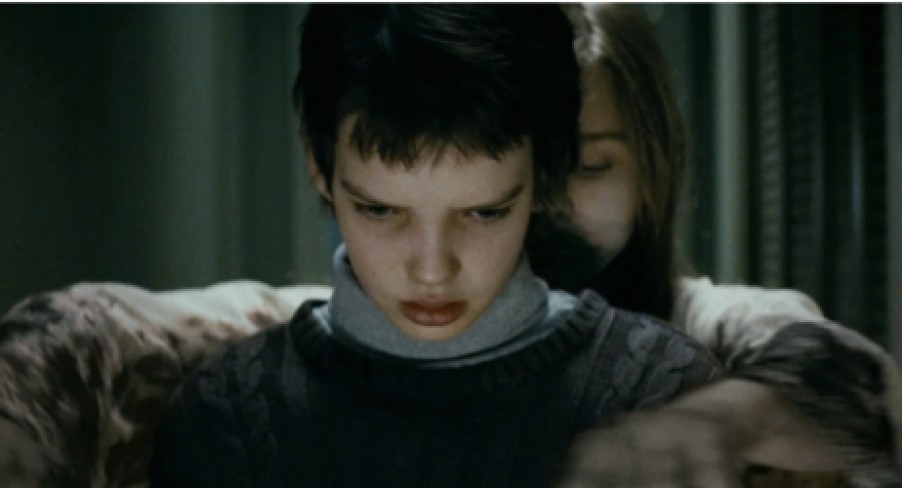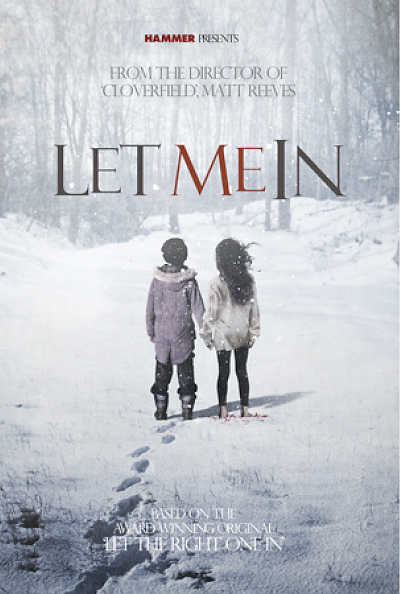 If you’re in anyway keyed into modern literature (or cinema and TV, for that matter), it’s sort of tricky to block out all the vampires that have cropped up over the past few years. It’s become a thing of the now to take the tales of books like The Twilight Saga, The Vampire Diaries and The Southern Vampire Mysteries/True Blood and bring them over to the big/small screen. So, it was only a matter of time when John Ajvide Lindqvist’s Let the Right One In would be retold with a wider audience in mind. Let’s set the context: director and screenplay writer Matt Reeves’ (Cloverfield) adaption isn’t the first for the book. The first happened way back (note the sarcasm) in 2008 and tah-dah, we were given Tomas Alfredson’s Swedish film Let the Right One In that garnered well deserved rave reviews. Then along came the news of an American remake and the only thought that ran through my mind was ‘why can’t people read subtitles?!’
If you’re in anyway keyed into modern literature (or cinema and TV, for that matter), it’s sort of tricky to block out all the vampires that have cropped up over the past few years. It’s become a thing of the now to take the tales of books like The Twilight Saga, The Vampire Diaries and The Southern Vampire Mysteries/True Blood and bring them over to the big/small screen. So, it was only a matter of time when John Ajvide Lindqvist’s Let the Right One In would be retold with a wider audience in mind. Let’s set the context: director and screenplay writer Matt Reeves’ (Cloverfield) adaption isn’t the first for the book. The first happened way back (note the sarcasm) in 2008 and tah-dah, we were given Tomas Alfredson’s Swedish film Let the Right One In that garnered well deserved rave reviews. Then along came the news of an American remake and the only thought that ran through my mind was ‘why can’t people read subtitles?!’
So, the forcefully renamed Let Me In is reset to 1983 in the town of Los Alamos in New Mexico. It tells the tale of twelve-year-old Owen (Kodi Smit-McPhee) who is struggling with his parents’ impending divorce and some serious bullies. One night whilst spying on residents in his apartment complex he sees his new neighbours – an older man and a girl, Abby (Chloë Moretz). As he begins to form a friendship with Abby, he notices she doesn’t wear shoes whilst in the snow, smells weird and never shows up during the day. Soon enough, trouble ensues with a dead body showing up here and there…
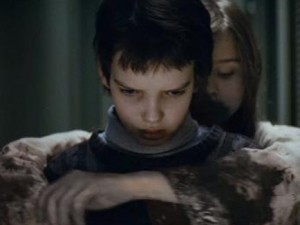 I’ll praise the film for is its cast, but in no way do either Smit-McPhee (The Road) or Moretz (Kick Ass) live up to Kåre Hedebrant or Lena Leandersson of LTROI but they do a fair job considering their youth. Mortez manoeuvres her way from sweet and innocent to bone-chillingly scary with ease but carries no real sense that Abby has been ‘twelve for a very long time’. Smit-McPhee shows he can play a realistic victim and loner but something about his portrayal left me sceptical enough to doubt that he was at his nerves end. Elias Koteas (Shutter Island) is the unnamed policeman. Being as remarkable as he is, Koteas manages to transcend the image his character may have well become had he been played by a lesser actor – he could have been an irritatingly placed copper who wants to end the bloody tirade but it’s hard not to want for him to succeed even though his being there threatens story we want to be told. Richard Jenkins (Six Feet Under) plays Abby’s ‘father’. As a veteran it shows and he plays the ‘father’ in a minimalistic manner which leaves you neither hating nor pitying him but leaving you on the fence long enough until you choose to decide. Someone who is cast in a smaller part, but by no means unimportant, is Dylan Minnette (Supernatural, Lost). Minnette plays the lead bully who has it out for Owen. His presence is more terrifying than that of any vampire since he’s the one who truly threatens Owen’s wellbeing.
I’ll praise the film for is its cast, but in no way do either Smit-McPhee (The Road) or Moretz (Kick Ass) live up to Kåre Hedebrant or Lena Leandersson of LTROI but they do a fair job considering their youth. Mortez manoeuvres her way from sweet and innocent to bone-chillingly scary with ease but carries no real sense that Abby has been ‘twelve for a very long time’. Smit-McPhee shows he can play a realistic victim and loner but something about his portrayal left me sceptical enough to doubt that he was at his nerves end. Elias Koteas (Shutter Island) is the unnamed policeman. Being as remarkable as he is, Koteas manages to transcend the image his character may have well become had he been played by a lesser actor – he could have been an irritatingly placed copper who wants to end the bloody tirade but it’s hard not to want for him to succeed even though his being there threatens story we want to be told. Richard Jenkins (Six Feet Under) plays Abby’s ‘father’. As a veteran it shows and he plays the ‘father’ in a minimalistic manner which leaves you neither hating nor pitying him but leaving you on the fence long enough until you choose to decide. Someone who is cast in a smaller part, but by no means unimportant, is Dylan Minnette (Supernatural, Lost). Minnette plays the lead bully who has it out for Owen. His presence is more terrifying than that of any vampire since he’s the one who truly threatens Owen’s wellbeing.
 Remakes tend to have a few things that don’t add up. Here, it’s specifically name changes. Originally, the protagonist – for English speaking countries, he’s Owen – was Oskar and Abby was Eli. If you’ve read the novel, Abby’s name switch makes sense for a writer who doesn’t want the trouble of delving into what may be construed as iffy territory so I’ll let it slide but Owen, really? If they had such a problem with a ‘foreign’ name, spell it with a ‘c’! Also, Reeves rewrites characters that were central to the original story by reducing their former status to that of Owen and Abby’s neighbours. This would be forgiveable if the audience were given the chance to form the slightest attachment to them but Reeves never grants that and thus leaves the audience to believe the only reason they’re present is for the necessary shock and gore of the Hollywood horror industry. It felt like the only people you were supposed to care about were Abby and Owen and the wreckage she causes to lesser characters i.e. the neighbours are there just so we can see a vampire do what they do best – I mean, who cares about the victims these days! Which leads me to the CG effects that Hollywood is known for ODing on – Reeves had to outdo Alfredson. Maybe I’m an old fashioned girl but less is more and although Reeves’ unnerved me a little, I preferred the simplicity of the original. And then there were the religious overtones. At one point, I thought I was watching The Omen. I can understand one over-religious character but all that operatic music when Abby gets all creepifying wasn’t necessary, I mean, I think I felt a yawn coming on.
Remakes tend to have a few things that don’t add up. Here, it’s specifically name changes. Originally, the protagonist – for English speaking countries, he’s Owen – was Oskar and Abby was Eli. If you’ve read the novel, Abby’s name switch makes sense for a writer who doesn’t want the trouble of delving into what may be construed as iffy territory so I’ll let it slide but Owen, really? If they had such a problem with a ‘foreign’ name, spell it with a ‘c’! Also, Reeves rewrites characters that were central to the original story by reducing their former status to that of Owen and Abby’s neighbours. This would be forgiveable if the audience were given the chance to form the slightest attachment to them but Reeves never grants that and thus leaves the audience to believe the only reason they’re present is for the necessary shock and gore of the Hollywood horror industry. It felt like the only people you were supposed to care about were Abby and Owen and the wreckage she causes to lesser characters i.e. the neighbours are there just so we can see a vampire do what they do best – I mean, who cares about the victims these days! Which leads me to the CG effects that Hollywood is known for ODing on – Reeves had to outdo Alfredson. Maybe I’m an old fashioned girl but less is more and although Reeves’ unnerved me a little, I preferred the simplicity of the original. And then there were the religious overtones. At one point, I thought I was watching The Omen. I can understand one over-religious character but all that operatic music when Abby gets all creepifying wasn’t necessary, I mean, I think I felt a yawn coming on.
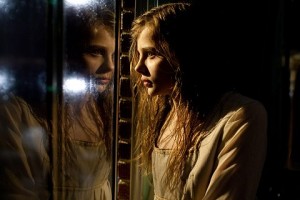 The thing about this film is that misconceptions are going to fly about. Because of the vampire craze that Twilight reignited, many disillusioned people, who are unaware of the novel and Alfredson’s adaption, will walk in seeking a Mills and Boone-type romance between a mortal and a vampire. Thankfully, Reeves stays true enough to Lindqvist’s story to breakaway from the soppy and overly hormonal lovey-dovey sparkledyness that Twilight has given us. The connection between Abby and Owen isn’t based on the physical – we hear neither character swoon over the other based on looks. It goes deeper, touching on themes like isolation, the desire to be noticed/wanted and the need to survive, all the while remaining truthful to the circumstances in which each arises.
The thing about this film is that misconceptions are going to fly about. Because of the vampire craze that Twilight reignited, many disillusioned people, who are unaware of the novel and Alfredson’s adaption, will walk in seeking a Mills and Boone-type romance between a mortal and a vampire. Thankfully, Reeves stays true enough to Lindqvist’s story to breakaway from the soppy and overly hormonal lovey-dovey sparkledyness that Twilight has given us. The connection between Abby and Owen isn’t based on the physical – we hear neither character swoon over the other based on looks. It goes deeper, touching on themes like isolation, the desire to be noticed/wanted and the need to survive, all the while remaining truthful to the circumstances in which each arises.
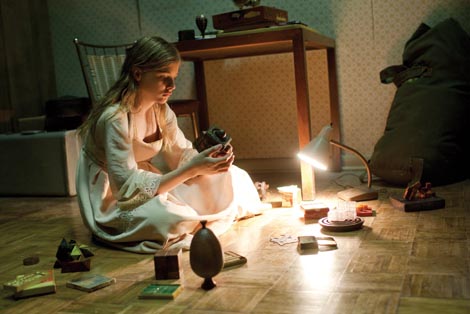 The main reason Let Me In will come across as a good remake, and by now we should know of which there are few, is because Reeves doesn’t try to fix what’s not broken. The dialogue for the scenes he left untouched is almost word for word. It seems the hype he’s received is because Let the Right One In was a good film and by sticking to that, rehashing chunks back to us, his version will go pretty much unscathed by critics. Frankly, his film is a good retelling – the actors can act, which is something that’s been taken for granted, its quite traditionalist in its depiction of the vampire, the shots are as beautiful as the original and the script reads well. Sadly, it has that Hollywood feel of being a tad overdramatic. The bullying scenes are a perfect example of this. The harassment Oskar receives seems slight compared to Owen’s treatment which is due to the score. Let Me In lacks the understatements that made its predecessor special partially because of a heavy dependence on a musical score that tries to sway how the audience should feel instead of leaving it to the actors – and there was me thinking that was what they were there for!
The main reason Let Me In will come across as a good remake, and by now we should know of which there are few, is because Reeves doesn’t try to fix what’s not broken. The dialogue for the scenes he left untouched is almost word for word. It seems the hype he’s received is because Let the Right One In was a good film and by sticking to that, rehashing chunks back to us, his version will go pretty much unscathed by critics. Frankly, his film is a good retelling – the actors can act, which is something that’s been taken for granted, its quite traditionalist in its depiction of the vampire, the shots are as beautiful as the original and the script reads well. Sadly, it has that Hollywood feel of being a tad overdramatic. The bullying scenes are a perfect example of this. The harassment Oskar receives seems slight compared to Owen’s treatment which is due to the score. Let Me In lacks the understatements that made its predecessor special partially because of a heavy dependence on a musical score that tries to sway how the audience should feel instead of leaving it to the actors – and there was me thinking that was what they were there for!
For those who can’t be bothered with subtitles, Let Me In should suffice for a vampire movie but for those who are tired with Hollywood’s trend of remaking films that honestly don’t need to be touched, go check out the original. Believe me, it’s worth it.
[xrr rating=3/5]
